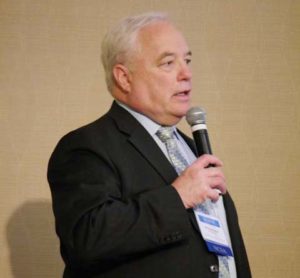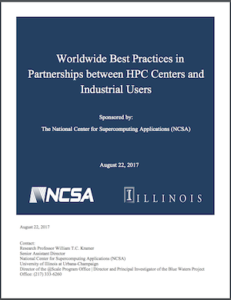
Bill Kramer is Bill Kramer
Senior Associate Director for the Blue Waters Project Office at NCSA
In this video from the HPC User Forum in Milwaukee, Bill Kramer from NCSA presents: Worldwide Study of Best Practices in Partnerships between HPC centers and Industrial Users.
Last month, NCSA and Hyperion Research released a new study that examines HPC and Industry partnerships. Aimed at identifying and understanding best practices in partnerships between public high performance computing centers and private industry, the study aims to promote the vital transfer of scientific knowledge to industry and the important transfer of industrial experience to the scientific community.
“Conducted by Hyperion Research on behalf of NCSA, This effort coincides with the National Strategic Computing Initiative (NSCI) to ensure that the United States remains a leader in the global HPC field.”
As more HPC centers across the globe are engaging in collaborations with the industrial/commercial institutions in order to help competitiveness and effectiveness, the need to understand best practices of these mutually beneficial partnerships has become paramount. This prompted NCSA to pursue the discovery of more effective practices with industry to serve as a reference for other already established HPC partnerships as well as for HPC centers considering such engagements.
This study represents the increased awareness and importance of HPC centers and industry collaborations, and the recognition that these partnerships need to be better understood. By understanding what is working well across the board, not just at a center, we hope many HPC center programs can adapt and grow to better meet the needs of our industry partners while conducting creative and informative research,” said Principal Investigator William Kramer of NCSA. “One of the most interesting observations to me is that the industrial partners and centers both value the HPC expertise that centers provide to the industrial project as much as the actual computing/analysis system access. I am confident that this study will have a very positive impact on the future of HPC center and industrial collaborations.”
 The study selected 40 academic and other HPC research centers for Hyperion Research to interview. 35 of these centers (87.5%) were found to provide industrial users with HPC resources and expertise to some extent, indicating that although HPC centers remain primarily focused on open science research, industrial users have become important communities to HPC centers.
The study selected 40 academic and other HPC research centers for Hyperion Research to interview. 35 of these centers (87.5%) were found to provide industrial users with HPC resources and expertise to some extent, indicating that although HPC centers remain primarily focused on open science research, industrial users have become important communities to HPC centers.
Among the several best practices determined by this study, Hyperion found that HPC centers should take their industry focus seriously and provided several possible steps to do so, including integrating their industry efforts into their mission statement, hiring the appropriate business-trained individuals to lead the programs, assigning experienced individuals to work with the industrial users, and employing industry-dedicated marketing to actively attract industry partners and promote the successes they achieve together. They also noted that for HPC centers to have successful industrial collaborations they need to prepare for and address any “cultural” workplace gaps in a timely matter, such as the fact that business projects typically operate on much shorter timelines than many scientific projects, and HPC centers may have different seasonal availability than businesses. The study also found that providing opportunities for both open and proprietary research, if possible, was beneficial to HPC centers, in that it allows them to attract a wider variety of industrial partners and that a streamlined process for intellectual property and contract agreements would be very beneficial for future HPC-industry collaborations.
Hyperion’s study indicates an overall positive future for HPC and industry collaborations. The number of these collaborations is expected to rise, as they predict increased recognition by national/regional political leaders of HPC’s ability to accelerate industrial and economic competitiveness as well as greater outreach efforts by public funding organizations and HPC centers to the industrial communities that could benefit from HPC.




